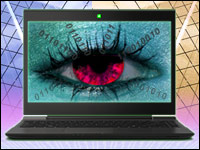
Internet of Things, Part 1: God’s Gift to the NSA
So there I was, grinding my coffee beans when the grinder’s AMOLED screen lit up with a message.
“We’re watching you, boy,” it read.
OK, I must’ve spilled some grinds, so I cleaned up the machine and brewed me up some coffee. Ten minutes later, cup in hand, I wandered down to the laundry room and began loading up the washing machine.
“Peekaboo!” read the message that appeared on its screen. “Have you been naughty or nice?”
Turning on the wash cycle, I fled upstairs in dignified silence and began making toast.
“You need to get some new shirts,” read the message on the toaster’s screen. “There’s a BOGO sale on at Macy’s.”
At that moment, my home entertainment system switched itself on and began blasting Black Sabbath’s “Paranoid” at top volume.
Right, that was it. I called Rodentski, my friend in the NSA, and suggested we meet for a coffee. As I hung up, my smartphone screen lit up. “You could always go for Polos,” the message on the screen read. “They’re on sale at Neiman Marcus.”
Anything Goes
“So tell me, my man, what is going on?” I said to Rodentski as we sipped on our coffees. “I’m getting these weird messages on all my connected devices.”
“Ah… uh…”
“Well? Are you guys now collecting all the messages sent over the Internet of Things?”
“Section 215 of the Patriot Act gives access to records and other items under FISA, and our work has been approved by the FISA Court,” Rodentski mumbled.
“Yeah, but that’s for tangible records… and the Privacy and Civil Liberties Oversight Board has pointed out it pertains to the FBI. You aren’t with the FBI,” I shot back.
“Hey, we gotta protect America from terrorists. You don’t want another Boston Marathon bombing, now do you?” he asked.
“OK, I buy that,” said I. “There are bad guys out there — but what possible interest could communications between my connected devices be to you?”
“You never know when a terrorist might use the CPU in one of those things for the guts of a bomb,” Rodentski replied. “Then there’s all these smart cars coming up. Easier to hack into them from a smart home device than to penetrate them directly. Might be able to eavesdrop on a terrorist’s phone conversations when he goes hands-free and uses the automobile’s speakers.”
“OK…,” I allowed. “It’s an infinite universe and anything is possible… but what if someone’s taking a hands-free personal call from a member of the family while driving?”
“We only collect the metadata, we don’t examine the content of the messages unless they contain something that raises a red flag,” huffed Rodentski.
“Well, you guys slipped up — I got pinged with messages to buy new shirts,” I said, somewhat indignantly.
“Dang it! Those AIs we’re using are getting way too smart for their own good,” he clucked.
The End Justifies
“So you know when I’m sleeping, you know when I’m awake, you know the state of my clothing so I have to get a new wardrobe for goodness’ sake?”
“Um, yes, something like that.”
“What about Google glasses? You collect data from them too?” I asked.
“Yeah, we can see what you can see — and you won’t believe how many people are using them in strip clubs.”
“My tax dollars at work, huh? My ears are bleeding.”
“We can tap into your hearing devices too,” Rodentski sighed.
“I hear those guys making smart home products and smart cars are now developing security measures to prevent surveillance. There’s a big push on for hardware-based security,” I said. I was feeling a faint glimmer of hope.
“Let them. We have their number. Embedded systems, hardware encryption devices, random number generators, you name it, we got it or we’ve suborned it,” Rodentski grimly replied.
“All in the name of keeping America safe, huh?”
“You’re darn tooting. Somebody’s got to do the dirty work.”






















































